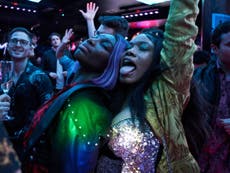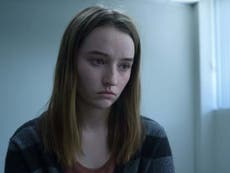Promising Young Woman’s rape plot has won praise – are we getting better at telling victims’ stories?
The relationship between cinema and TV and rape is complicated, to say the least. But there are positive signs of change in how sexual violence is discussed on screen
Your support helps us to tell the story
From reproductive rights to climate change to Big Tech, The Independent is on the ground when the story is developing. Whether it's investigating the financials of Elon Musk's pro-Trump PAC or producing our latest documentary, 'The A Word', which shines a light on the American women fighting for reproductive rights, we know how important it is to parse out the facts from the messaging.
At such a critical moment in US history, we need reporters on the ground. Your donation allows us to keep sending journalists to speak to both sides of the story.
The Independent is trusted by Americans across the entire political spectrum. And unlike many other quality news outlets, we choose not to lock Americans out of our reporting and analysis with paywalls. We believe quality journalism should be available to everyone, paid for by those who can afford it.
Your support makes all the difference.Promising Young Woman, the debut film of Emerald Fennell (former Killing Eve showrunner), is causing quite the stir in the US ahead of its Christmas Day release.
Carey Mulligan stars as a woman in pursuit of vengeance following the rape (and later suicide) of her best friend in what has been described as a “game-changing” thriller for the #MeToo era. Reviewers at Sundance Film Festival, where it played earlier this year, praised its bravery in making rape, and more specifically rape culture, the story. It tackles ideas about toxic masculinity, the normalisation of sexual assault, disbelieving authorities, and an unscrupulous and unhelpful legal system.
Those of us in the UK will have to wait until February to pass comment on the film and its story, but it will no doubt be interesting to see if, and how, it progresses the depiction of rape and sexual violence on screen.
Popular culture can provide something of a mirror to society, starting important conversations and challenging entrenched norms. That is particularly true for stories centred on rape and sexual violence. But the relationship between cinema and TV and rape is complicated, to say the least.
The John Hughes films of the 1980s present sexual assault as a humorous plot device, reflective of the “brush it off” culture that persists in some places to this day. Nowhere is this more notable than in Sixteen Candles, one of his most popular films. Constance Grady penned an interesting comparison between the date-rape scene and the defense presented by Brett Kavanaugh in the high-profile 2018 case.
Though we might be moving away from such flippant references to sexual violence, we do still see rape being used as a repellent, exploitative device.
One of the most talked-about TV series this century, Game of Thrones, was widely criticised for its tendency for “sexposition”, using gratuitous sex scenes to titillate or shock. This came to the fore with a notorious rape scene that its defenders suggested was crucial to establish the true horror of the attacker (a man who routinely tortures and even fed someone to the dogs).
This was, perhaps, provocation for provocation’s sake, and that is so often the way that rape is portrayed.
The likes of Roman Polanski and Lars von Trier have made a number of films in which sexual violence against women is used as a plot point – but so little time is devoted to the long-lasting impact and trauma, specifically the psychological consequences, of this violation. 1988’s The Accused would be a notable exception to this.
There is also a tendency towards a very homogenous representation of rape. Victims are predominantly young, white women and attacks disproportionately involve violence, weapons, physical injury or multiple attackers.
That is not to say that such stories should never be told. But it is telling that so many high-profile films that feature rape are so heavily blurred by the male gaze and, as such, dismissive of the lived realities of sexual violation.
Instead of the interpretation of the offence itself – which has been widely written about – I’d like to focus on the way in which stories address the long shadow of sexual assault.
Documentaries present an interesting space for this. Roll Red Roll, based on the Steubenville High School rape case, is a well-made investigation. What is striking, though, is how eerily familiar it feels to any number of true crime documentaries (which have become more and more popular with viewers) in its construction and delivery.
These documentaries often zero in on the extremes of crime – horrific incidents, cases with judicial failings, or high-profile victims or perpetrators. They unravel like an Agatha Christie novel, giving us breadcrumbs of pieced-together evidence, with the aim to shock us.
Roll Red Roll should be more shocking to us. But we stopped being shocked a long time ago.
Why? In the UK, only 15 per cent of sexual violence cases are reported to the police, and only 7.5 per cent of rape charges result in conviction. It is a similar story in the US and elsewhere.
We are conditioned to expect rape and sexual assault to be unreported, and those that are reported will likely never lead to conviction. Indeed, that the perpetrators of Steubenville High School were eventually tried and convicted was perhaps the biggest shock of all.
Fortunately, a new wave of storytellers appear to be moving us towards more nuanced and honest narratives with scripted mini-series like Unbelievable and Michaela Coel’s I May Destroy You. At the heart of these shows is a more personal, intimate reflection on how victims are treated in the wake of sexual assault.
That these two shows resonated so strongly with people is testament to excellent writing and direction, but also the horrific normality of this. So many people felt echoes of their own self-doubt, their shame, their experiences of being brushed aside by people around them and in police interviews.
That Arabella in I May Destroy You is ultimately able to correctly identify her assaulter is good, too, because her intoxication during the attack did not (as it does not in reality) impair her ability to recall pertinent information.
Yes, these are fictional stories. But in dispelling the myths around alcohol and memory, and in addressing the systemic failings in pursuing rape cases and supporting victims, they present something that is more reflective of reality than the stories that have gone before – many of which served to reinforce dangerous falsehoods.
The troubling numbers from across the world tell us that we need to be having more conversations about the prevalence of rape and a justice system that seems unfit to counter it. One would hope that the critical success of shows like this will encourage more accurate representations of the realities of rape and sexual assault on our screens.
Dr Heather D Flowe is a reader in forensic psychology at the University of Birmingham. Her research investigates memory in the legal system and methods to improve the accuracy of rape complainant statements and testimony




Join our commenting forum
Join thought-provoking conversations, follow other Independent readers and see their replies
Comments